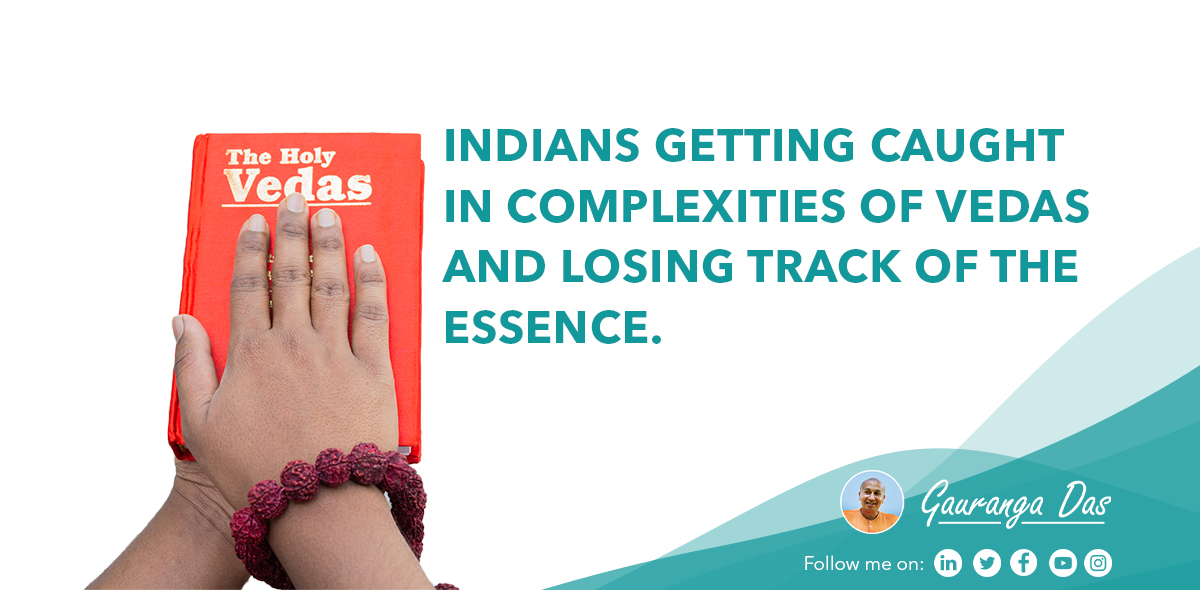Although India has such a powerful spiritual culture, we still find that the youth is completely disconnected from the spiritual ethos of this country. The reason is, there is no forum where spiritual instructions are given as it is for the people of this age. And everyone has their version of the story to tell when it comes to the epics like Mahabharata or Ramayan. Therefore, deep within, the youth is highly confused about their cultural identity. Mostly, the Indian culture is confused with merely the entertainment industry’s appropriation or the sports mania that seasonally sweeps off the nation.
Impressions inherited by Indians
There are sanskaras or impressions that the youngsters inherit from their Indian family roots. Usually, it is filled with lots of spiritual instructions. That, even their habits formed right from a very young age majorly consist of going to the temples, visiting holy places like families, observing festivals etc. Then as the children start growing up, they start asking questions to their parents as to why they are doing what they are doing. They start searching for substantial reasons for why do they visit temples or celebrate Diwali, wear tilak or cook prasadam for the Lordships in their house. However, sadly they are disappointed with lousy or inadequate reasoning. Many of the older generations often state that they follow such and such rituals because it has been traditionally carried from generations. Yet, they lack sufficient conviction and science of their practices.
Caught in the detail
The other side of the picture is, like I mentioned before, in India people know too much about Lord Rama, Lord Krishna and Shiva that they get caught up in the details and the jugglery of words in Vedas, and thus end up losing track of the true essence of such spiritual teachings. Even Lord Krishna in Bhagavad Gita bereft such people and call them as avipascitah “Men of small knowledge” who get very much attached to yam imam puspitam vacam the flowery words of Vedas. His bold statement is referring to the externalities offered by the Vedas like fruitive activities for elevation to heavenly planets, resulting in good birth, power and so forth. Lord Keishna discourages the idea of being desirous of sense gratification and materially opulent life that binds one to the cycle of birth and death.
What do the Vedas recommend?
Because, the Vedas typically recommend Dharma, Artha, Kama and Moksha, Religiosity, economic development, sense gratification and liberation. However, the essence of vedic literature, Srimad Bhagavatam mentions ‘Dharmasya hy apavargyasya’ meaning that all the occupational engagements must never be performed for material gain and shall not use them for sense gratification. The same Bhagavatam states ‘Sa vai pumsām paro dharmo yato bhakti adhoksaje’ that The Supreme Occupation or Dharma for all humanity is to attain loving devotional service unto the transcendent Lord.
This variant between the actual Veda and its essence Bhagavatam is because Vedas prescribe two different types of occupation for the human being. One is called the pravrtti marga or the path of sense enjoyment, and the other is called nivrtti marga or the path of renunciation. Obviously, the path of sense enjoyment is inferior than the path of sacrifice for the Supreme Cause. The reason is, in essence, we are all spirit souls. Neither the body is made of flesh and bones nor the constructive identities of the mind, intelligence and false ego. The material existence of the living entity is often compared to a diseased condition and the material world is a perverted reflection of the spiritual abode of the Supreme Lord. The soul inherently has a spiritual existence and is eternal, full of bliss and knowledge. Yet, due to it’s independent choice to be in contact with the matter, it gets entangled to the illusory nature of this universe and suffer from the temporary miseries in repeated cycles.
Vedas mention only one Supreme God
The Vedas doesn’t necessarily confuse us. However, offers different processes for diverse audience. In fact, it is inclusive in its nature and leaves space for personal and independent choices of every individual. Yet, due to the influence of the age of Kali, it indeed deviates the mass from seeking the essence. The reason why many Indians are conflicted when it comes to even being sure of whether sanatana dharma is polytheistic or monotheistic is because of getting lost in the vast ocean of Vedas and the 18 puranas. Indeed, Sanatana Dharma, popularly referred to as Hinduism indicates only one God or Bhagavan. And the direct instructions given by him is called as Bhagavad Gita it Song of the Lord. In fact, Lord Krishna in Gita is never mentioned as a mythical figure or historical personality. The texts mention him as Bhagavan or Supreme Personality of Godhead.
True essence of Vedas is born as Srimad Bhagavatam
The compiler of Vedas and Vedanta, Sage Vyasadev himself was frustrated and dissatisfied with his strenuous work in compiling all the scriptures for the benefit of humanity. Because, still he felt, he failed to present a scripture that would capture the core of Vedas. Upon the instruction of his spiritual master Narada Muni, he came to acknowledge that he mentioned several instances throughout all literature that would make the world understand that Dharma Artha Kama Moksha are mere entanglements of this material world and the ultimate goal is to attain supreme Lord. He hardly wrote the glories and pastimes of the Supreme Lord and his devotees which helps one get closer to Krishna.
janma karma ca me divyam
evam yo vetti tattvatah
tyaktvā deham punar janma
naiti mām eti so ‘rjuna (Bg. 4.9)
Those who understand the transcendental nature of the Lord’s appearance and activities, upon leaving their material bodies need not take birth again. And they will easily attain the abode of the Supreme Lord. The Lord’s divine birth, qualities, form, pastimes and names are enough to purify the entire universe. Understanding this, for the benefit of all humanity who may get trampled in the terrible manifestation of Kali yuga, Vyasadev complied this sublime scripture of Srimad Bhagavatam, the milk of all Vedas for us to transcend the attachments arising from religiosity, economic development, sense gratification and desire for liberation and get purified to attain the unmotivated and uninterrupted loving service to the Supreme Lord.




